It’s a Sin and Sex Education stars on why their queer HBO horror hits a little too close to home
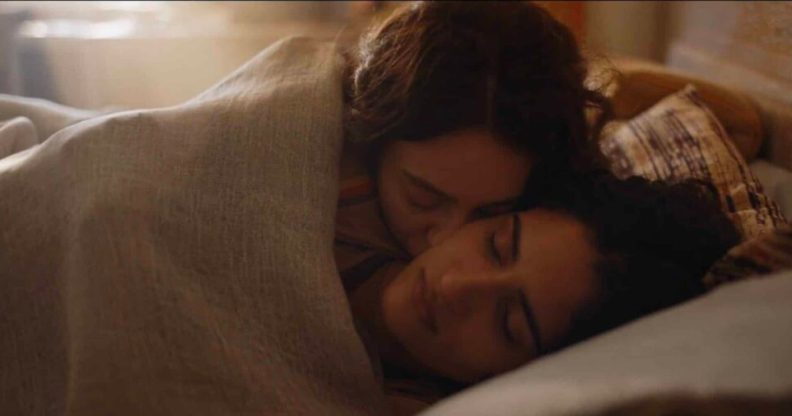
Tanya Reynolds and Seyan Servan as Helen and Nour in The Baby in bed together. (HBO/Sky)
Tanya Reynolds and Seyan Sarvan, who play star-crossed lovers in HBO’s The Baby, on forgotten women in history, the fight for bodily autonomy and serendipitous casting.
Released against the political backdrop of Roe v Wade’s repealing and the mounting attack on women’s rights, The Baby is a horror comedy which doesn’t shy away from condemning society. In the present day, we follow the plight of a woman named Natasha (Michelle De Swarte), who is held hostage to her demon baby, with a parallel plot set in the ’70s.
When Helen McGregor (Sex Education’s Tanya Reynolds) meets Nour El-Mistry (It’s a Sin’s Seyan Sarvan) in a library charged with the revolutionary fire of female liberation, they embark on an affair. The consequences soon see the two torn asunder and Helen’s rights to her own body stripped away.
For both Tanya and Seyan, The Baby set them on a learning curve they could never have imagined, as they explained to PinkNews.
PinkNews: What is the importance of the stories that are being told in The Baby?
Tanya: Helen and Nour’s storyline is two women who are forced to be apart and Helen is forced to have a child that she does not want to have. And even though at the time, when this is set, abortion was legal in the UK, the husband still had the right to choose. The right was with him, not her. So Helen had no power over her own body.
What is striking and baffling and haunting is the fact that this show is a horror and our episode is set in the ‘70s. It should not be recognisable as something that is still happening today. It should be a horror that exists purely in fiction and yet, in some parts of the world, it is real. And it’s the dated, misogynistic, horrifying idea that women are nothing more than child-bearing vessels. It’s terrifying. It’s so frightening. That’s why we think this show is so so important. Because when you are horrified you remember, it’s actually more real than it should be.
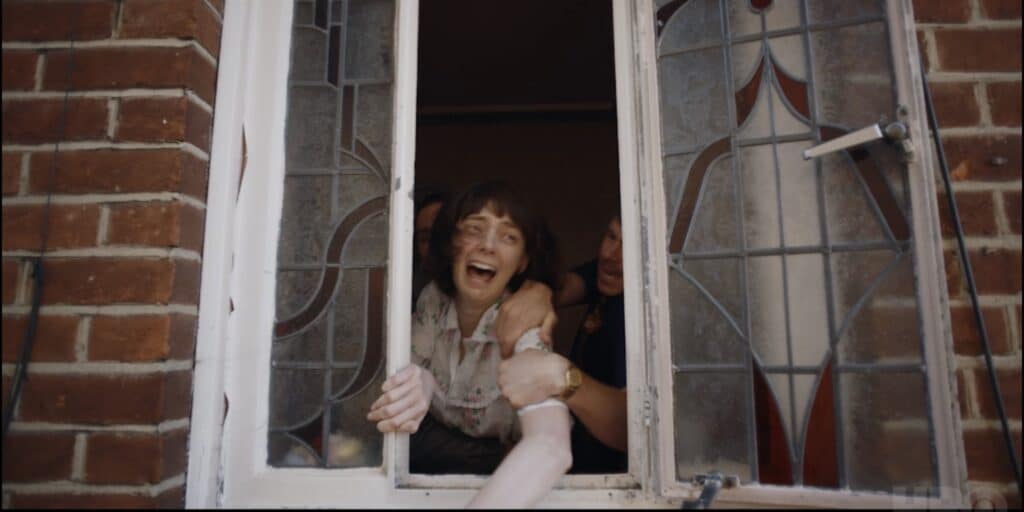
Tanya Reynolds as Helen in The Baby attempting to escape out the window. (HBO)
Seyan: I think it’s really key to ensure that shows like this aren’t muted, because that’s what tends to happen. They should be in the mainstream media. I know for me it’s really rare to be on set with the amount of women, Black and brown people, and queer people of all gender identities that we were with – and that needs to be seen.
But also when it comes to same-sex love stories between women, lesbian love stories, it’s always quite diluted. Or it can be shown from a very male, patriarchal perspective and I think we need to get more stories out there that are authentic like Helen and Nour’s. For Nour, an immigrant who’s coming from an Islamic country during the Egyptian revolution of the ’70s, there’s no way she could have been who she is. She comes to the UK where everybody felt like they were on the brink of a new age and there was a lot of hope, which I think Nour very much encapsulates.
We see a Muslim who is a gay woman. We see the role Black and brown women played in the female liberation movement. We see the role lesbians played in the gay liberation movement. I remember our costume designer, PC Williams, had her wall covered with these Black and brown women who were marching and these Bangladeshi women in Saris, and I was like, ‘f**k, I never knew that happened’.
How did you end up in your roles as Helen and Nour, and what drew you to your characters?
Seyan: So I initially auditioned for a different character and then, when the description of Nour came in, it just clicked. The character came into my life during a time where I needed the things that she represents. She is filled with hope and faith and bravery and she had a vision of being able to love who she loves, live with them, potentially have a family with them. She believed that in a time where the possibility did not exist because we’ve got the backdrop of the ‘70s. That was really inspiring to me.
Tanya: Same! I auditioned for a different part which I couldn’t do because it clashed with something else and I was broken-hearted, I really wanted to be involved in the show in any way. I just thought: ‘This is so brilliant and I’ve never read anything like this.’ And then about a month later, I was asked to audition for Helen, which just fit me so much better. And I was obsessed with it. And I just thought it was such a beautiful, horrible, painful story that I just really really wanted to tell.
Why is diverse storytelling so important?
Seyan: Both me and Tanya are people who don’t fit the moulds of the mainstream media and societal norms but we benefit very much from being born in this time. As a kid, film and theatre really saved me. I needed that escape from reality. When I would enter new worlds I’d feel less alone, but no one looked like me. No one felt like me. Even in Bollywood, I wasn’t like any of the Bollywood actresses.
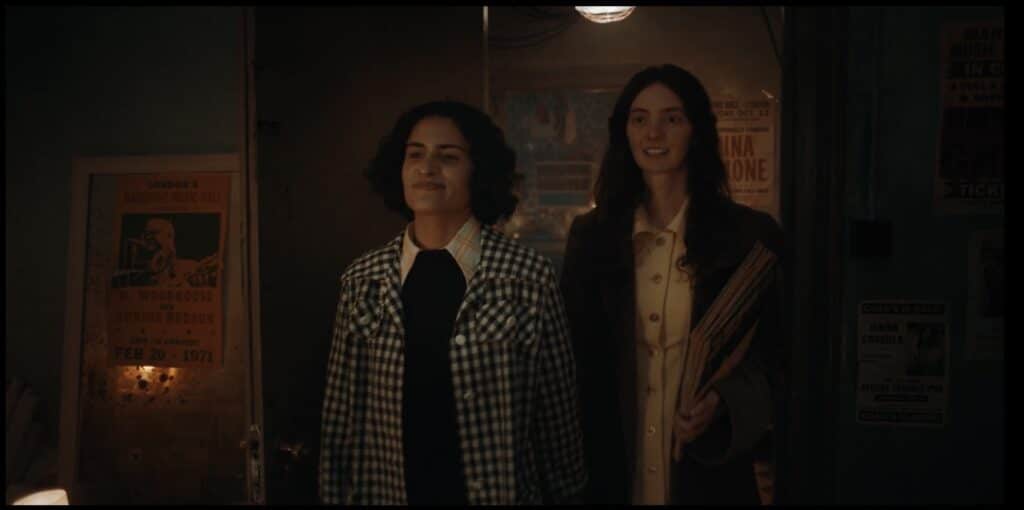
Tanya Reynolds and Seyan Sarvan as Helen and Nour in The Baby. (HBO/Sky)
Groundbreaking characters are so important to show people who are marginalised that there’s a space for you. For my character Lizbeth, in It’s A Sin, we saw a queer, female Muslim lawyer in the 80s who was standing as an ally with her gay brothers during the AIDS epidemic. That took away stereotypes that many people feel that the Muslim community have towards the queer community. We have the same once again, with Nour.
Tanya: TV is our most accessible educational tool and if you keep showing the same stories with the same people, and the same relationships, you grow up thinking that is the only way to be. We can show everyone that there’s not just one way to live, or one way to love, there are a million ways to live.
Helen, she’s a perfect example of someone who was just brought up assuming that this was the life that she was meant to have because that was just the way things were. She was a woman and she married a man and she just fit into that norm. It wasn’t until she met Nour that she realised: ‘Oh, there are other ways to live.’
What resonated with you most about your storyline?
Seyan: Nour and Helen is not just a stereotypical love story. Through them you see the expectations that were put on women during that time. For me as a brown woman living today, I can walk down the street, and I can hold somebody’s hand, and I can kiss them. Maybe I’ll get a few looks from pervy guys and a disappointed aunty. But if I had done that in the ‘70s, I would have faced police brutality and abuse without protection.
But that’s still happening, I’m safer but not completely safe. In India, where I’m ethnically from [being queer] is basically still illegal. Until we all have the same rights we need to keep going with this. Nour just reminded me to not take the freedom and the liberation that I think I have for granted. These are the people that you have to thank for it.
It’s also been beautiful to see the amount of queer women that have approached me saying stuff like ‘I wanted to see more of Helen and Nour’ and ‘thank you’ and what it meant to them. We do have audiences that want to see this and need this.
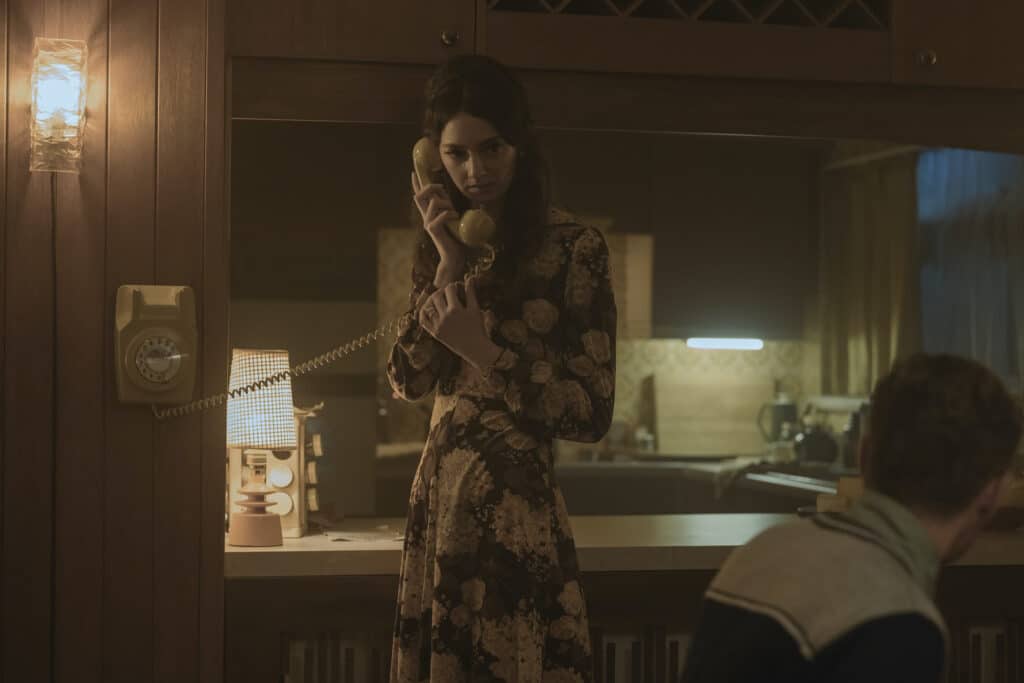
Tanya Reynolds as Helen in The Baby on the phone to Nour. (HBO/Sky)
Tanya: What I loved, in particular, is that we had a good couple of days where we talked about our characters and it was so useful to do an archaeological dig into Helen’s mind and ask questions like: Has she always known that she was gay or is she even gay? How did she fall into this life? Did she meet Nour and discover this whole other world which she felt more at home in? Or was she just curious but at the time, you weren’t allowed to be curious, you were one thing or another?
Back then homosexuality was seen as an illness and Helen’s family and husband really, really do believe that she is ill. They think that they’re helping her by drugging her and forcing her to have this child. They think that this child will be the remedy that once she holds it, she’ll be like, ‘Oh, silly me, what was all that about?’.
Seyan, you worked with LGBTQ+ activist Lisa Power to research your character.
Seyan: Yeah she is just a big, amazing, groundbreaking activist. She reached out to me after It’s A Sin because my character reminded her of somebody that she had worked with during the time. And then I reached out to her during The Baby. She sent me a collection of books such as Five Women by Tony Parker and Baby Face by Randy Salem. These are books by male psychologists. This guy got a group of queer women together to analyse and diagnose them on why they might be queer. It’s deeply offensive but it was eye-opening.
Lisa also spoke about her experiences of being a gay woman during the ‘70s. She remembered walking down the road and being heckled at if people even got an instinct that she might be gay. She remembered being punched, and the severe abuse she received. That you wouldn’t even dream of kissing your partner, or holding their hand. We see glimpses of this in The Baby when Helen and Nour walk in and you see the squat that they’re living in, and the Black and brown women that are there. You see the stories of women going to prison for defending themselves, the police turning up at the door to get Helen.
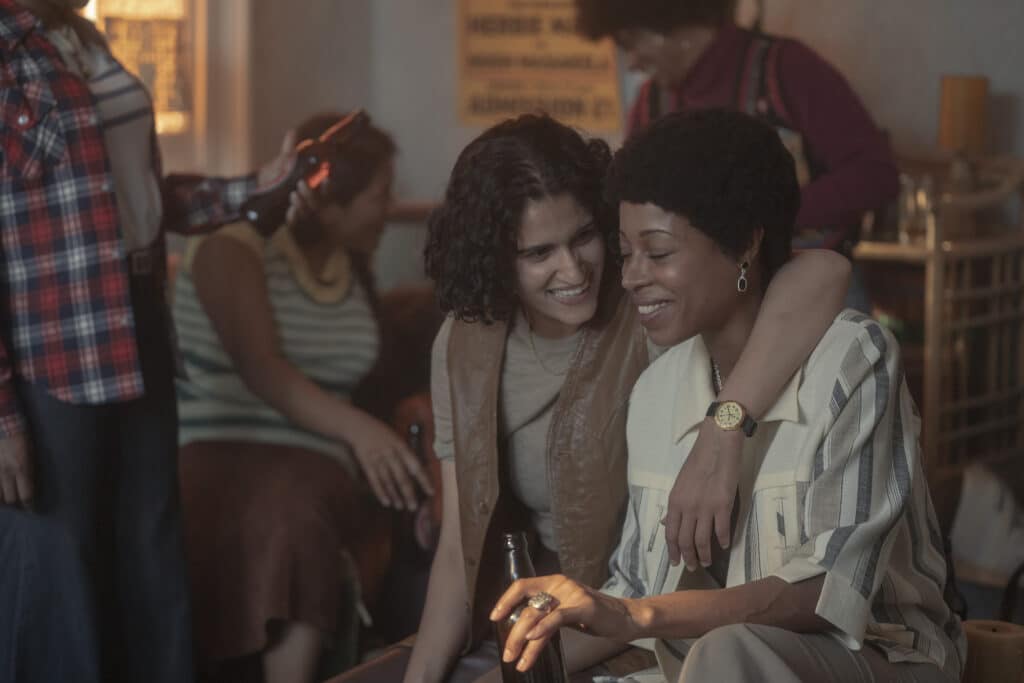
Seyan Sarvan in The Baby. (Sky)
She also touched on the divide of Black and brown squats from white female squats. That divide is something we see even today within the LGBT community when we should all be coming together. Especially with what’s been happening recently with the trans community, because we’re all fighting the same fight, right.
What are your hopes for representation on the screen going forward and your place in it?
Tanya: I think TV is going in an exciting direction. There are so many stories that are challenging social norms and I’m all for it to keep heading in that direction. As an actor, I just want to do as many different things as possible, that’s the goal for me. To have a career that’s as versatile as it physically can be. It’s why I do what I do because I just really enjoy playing other people and dressing up and putting on silly voices.
Seyan: Diversity is very new. I hope it keeps amplifying to the point where it’s not, ‘Oh, we’ve ticked the box of diversity’, but it’s just stories. We’re just showing stories. Whether you call it God, or the universe, the powers that be, light, whatever you call it – it has put all of us on this earth and we’re multifaceted beings and all of our stories deserve to be heard.
I’m currently in the process of forming a story around the Partition [of the Indian subcontinent]. Obviously, my grandparents were involved in it very directly but we don’t really know much about it. There was a figure named Mai Bhago, she was like the Indian Joan of Arc and was described as a male soldier. Through sacrificing herself she saved the whole army and liberated so many people and can you believe that none of us have heard of her?
Any last thoughts?
Seyan: Tanya. There’s a scene when Helen and Nour are in bed and they’re looking at each other. So they were getting the camera ready to shoot and Tanya, as Helen, was looking at me in preparation for the scene and you know, when somebody looks at you and everything just goes pfffff and you just feel like you’re there. What hit me is how important that is in the story. To feel present sometimes it takes connection and feeling that you’re seen. We just need to be given those environments where it is safe to do that. And I think I’ll always remember that moment where I felt safe to be.
The Baby is available to stream on HBO Max in the US and Sky and NOW TV in the UK.

